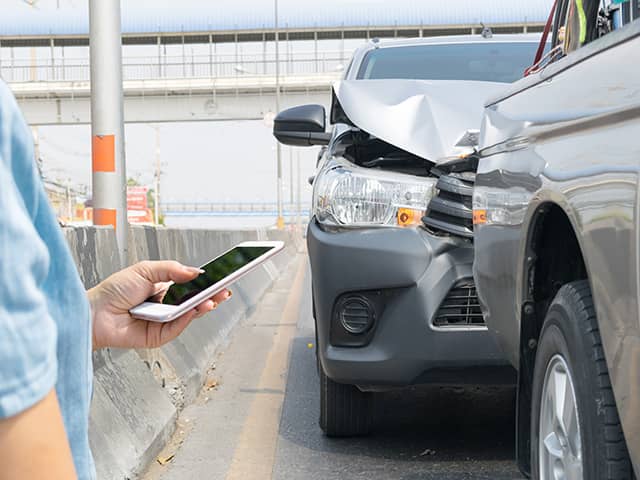
You’re driving down the highway, obeying all the rules of the road, when out of nowhere, another vehicle swerves into your lane. In that split second of panic, the sound of crunching metal rings out as the other car plows into yours. You’re shaken up but thankfully unhurt – or so you think at first.
As the dust settles, the sobering reality hits…the accident caused major damage to your vehicle. That’s your reliable mode of transportation, your daily commuter, potentially thousands of dollars worth of value, now crumpled. Looking around the wreckage, you realize other possessions were affected too – your laptop, the camera you invested in, and your kid’s booster seat in the back, all destroyed or thrown about.
At Pickford Law, this is far from an unfamiliar scenario we’ve seen play out. After a car accident, many clients primarily focus on any physical injuries sustained and potential medical costs. But the property damage sustained can also be extensive – and dealing with those claims is crucial.
Under Tennessee law, “property damage” encompasses any harm or destruction caused to another person’s property due to someone’s negligence or intentional actions. In the context of a car accident, this includes:
Essentially, if you got into a collision that harmed someone else’s vehicle, belongings, or other property in any way, that all legally qualifies as compensable property damage. The at-fault party and/or their insurance carrier then becomes liable for those losses, not you.
If the accident was definitively caused by the other driver’s negligence (running a red light, reckless speeding, distracted driving, etc.), you should be entitled to have all associated property damage costs covered by their liability insurance policy. This includes:
However, if you were found to be partially at fault, liability would be proportionally split based on each party’s percentage of negligence. So, if you were deemed 30% at fault and the other driver 70% at fault, their liability insurance would cover 70% of your total property damage.
What if the other driver had no insurance at all? That’s where your own auto policy’s uninsured motorist property damage coverage kicks in to pick up the slack. While not legally required by Tennessee, this optional add-on safeguards you in these all-too-common scenarios.
No matter whose insurance is liable, you’ll need to formally file a property damage claim. Many clients instinctively want to go straight through the at-fault driver’s carrier, but that’s not always advisable.
At our firm, we typically recommend filing a claim through your insurer’s collision coverage, even if the accident clearly wasn’t your fault. There are a few key reasons for this:
The claims process starts by promptly notifying your insurer of the accident – Tennessee has a 3-year statute of limitations for filing property damage claims. You’ll need to submit documentation like:
Your insurer will investigate, potentially subrogate against the at-fault driver’s carrier for reimbursement, and approve releasing a claims payment to you if coverage applies.
In severe collisions, damage to your vehicle may be so extensive that your insurer deems it totaled or a “total loss.” This designation usually applies when repair costs exceed a certain percentage of the vehicle’s pre-accident cash value (often around 60-70%).
If totaled, you’re entitled to reimbursement for your vehicle’s fair market value leading up to the accident rather than just repair costs. However, calculating an appropriate valuation requires more documentation, like comparable sales listings in your area, to determine an accurate pre-damage amount.
Additionally, if your totaled vehicle is still financed or leased, your insurer’s payout must account for paying off the remaining loan balance. This tends to draw out the overall process and requires more coordination between lenders/lessors compared to standard repair claims.
In most situations, dealing with property damage claims after a collision doesn’t inherently require hiring legal counsel.
However, there are certain scenarios where involving an experienced Tennessee car accident attorney is absolutely advisable:
Insurance companies are motivated by protecting their profits above all else. Having an attorney who specializes in this arena advocating forcefully on your behalf from day one can:
When your vehicle and personal belongings have been damaged through no fault of your own, you deserve adequate reimbursement for those losses without being taken advantage of by profit-driven insurers.
One of the biggest issues with property damage claims in Tennessee is the relatively low minimum liability insurance requirements. Currently, drivers are only legally obligated to carry:
While personal injury claims can tap into an at-fault driver’s additional assets, that scant $25,000 property damage minimum is the absolute cap on what their liability insurance will cover if they have no other assets. With the high repair costs for many modern vehicles, that amount gets maxed out quickly.
So, what options are available if the at-fault driver’s insurance can’t fully cover your property damage costs? Two potential avenues we pursue:
These low liability minimums routinely victimize Tennessee drivers who are already suffering from the trauma, inconvenience, and losses endured from a collision that wasn’t their fault. While I wish I could say the process is always smooth and agreeable, the reality is that having a knowledgeable attorney advocate on your side makes a world of difference.
If you’ve experienced any property damage after a car accident in Tennessee, the team at Pickford Law is here to guide you through every legal avenue to get maximum compensation. Your case is our cause – reach out today for a free consultation to put our team’s experience in your corner.